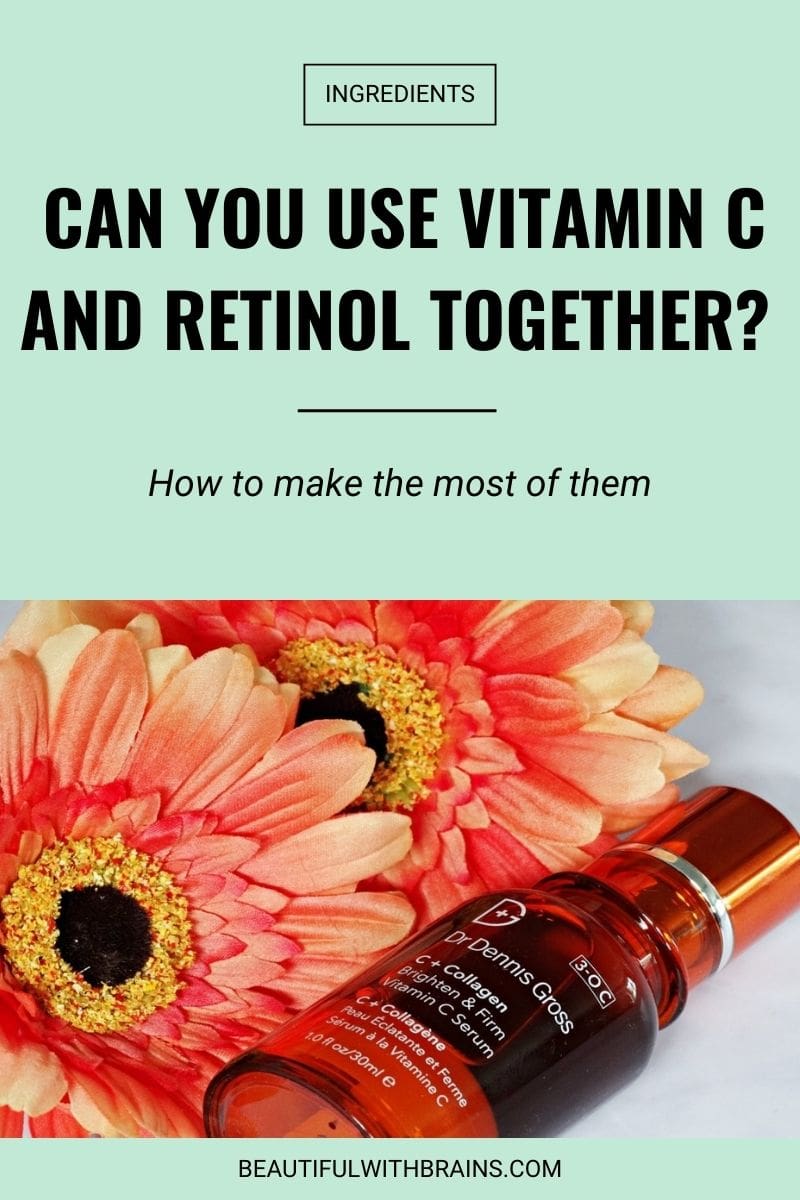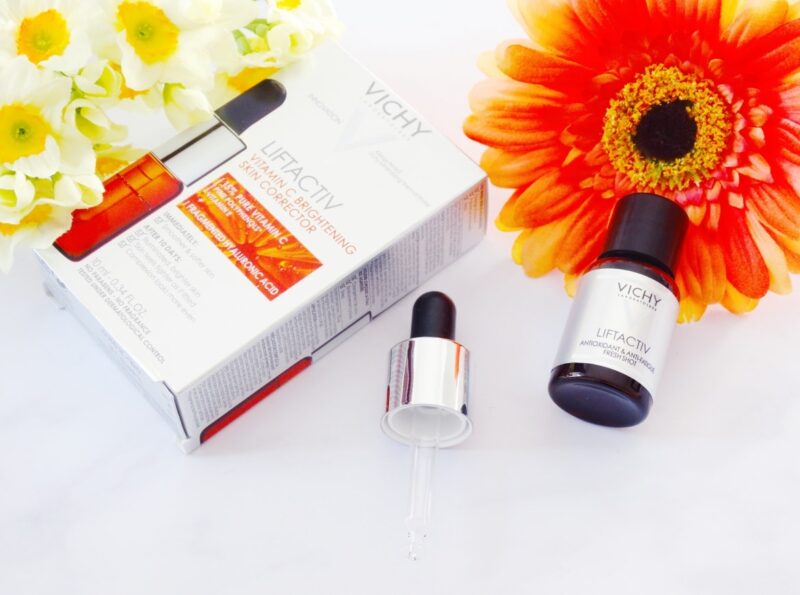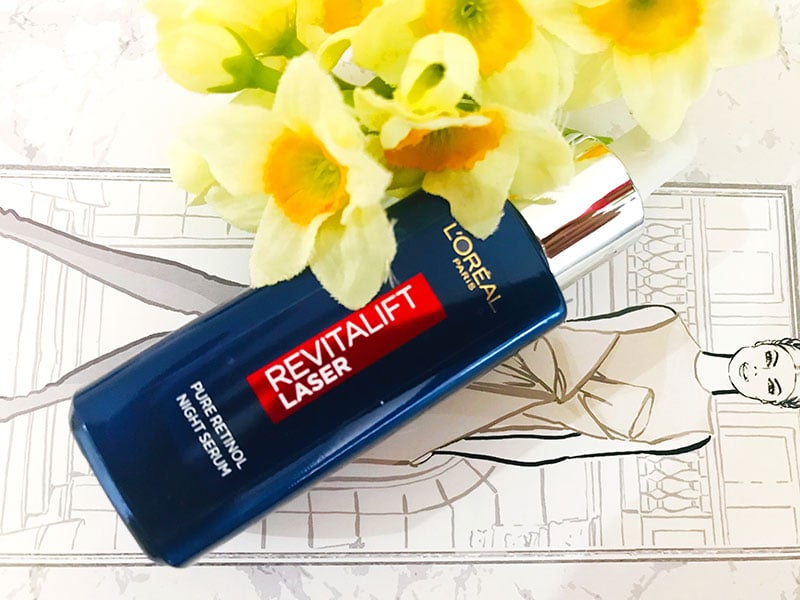
“Can you use Vitamin C and retinol together?” It’s one of the questions that I get asked more often by the Beautiful with Brains community.
Alone, Vitamin C and retinol are two anti-aging powerhouses that kick wrinkles and dark spots in the butt and give you a smoother, brighter complexion. If you’re serious about anti-aging, you need both in your skincare routine. Period.
BUT…
Rumour has it, their pHs are totally incompatible. Use Vitamin C and retinol together and they deactivate each other, becoming useless. Bummer, right! At least, if it were true.
Is it really true, though? Or is this just another rumour spread by well-intentioned skincare fans who don’t have a solid understanding of the science? (Reading those long and boring scientific studies isn’t easy for anyone, ladies!). Here’s what science has to say on this skincare feud:
- Vitamin C: What It Is And How It Benefits Skin
- Retinol: What It Is And How It Benefit Skin
- Can You Use Vitamin C And Retinol Together?
- Why Should You Use Vitamin C And Retinol Together?
- Are There Any Side Effects When You Use Vitamin C And Retinol Together?
- How To Use Vitamin C And Retinol Together: Which One Goes First?
- Can You Use Vitamin C And Retinol Together?
Vitamin C: What It Is And How It Benefits Skin
Vitamin C is an antioxidant on steroids. Most people think it’s just one ingredient, but it comes in soooooo many forms. Even I struggle to keep tracks of how many types of Vitamin C now exists – scientists keep coming up with a new one every month (or so it seems!).
L-Ascorbic Acid is the pure form of Vitamin C. It’s the most effective for anti-aging and skin-brightening, but also the most irritating (in high doses) and unstable (it goes bad fast). Hence why scientists feel the need to come up with new types of Vitamin C that keep the anti-aging job well without the side effects.
Other forms of Vitamin C include:
- Ascorbic acid polypeptide
- Ascorbyl glucosamine
- Ascorbyl glucoside
- Ascorbyl palmitate
- Ester-C
- Ethyl ascorbic acid
- Magnesium ascorbyl phosphate
- Sodium ascorbyl palmitate
- Sodium ascorbyl phosphate (my fave form of Vitamin C for acne-prone skin)
- Tetrahexyldecyl ascorbate
These are all derivates of L-Ascorbic Acid. They’re less effective, but gentler on the skin and last longer.
Why is Vitamin C in your skincare products? What are the Vitamin C benefits for skin? Here they are:
- It fights free radicals: Free radicals are the nasty molecules that give you wrinkles and dark spots. Your body produces a small amount of free radicals every day just through breathing and metabolic processes. But, in the modern world, pollution, unprotected sun exposure, and a diet rich in processed foods dramatically increase the number of free radicals in your skin. Enter antioxidants like Vitamin C. Vitamin C patrols your skin looking for free radicals. Once it spots its enemy, it neutralises it before it can give you wrinkles. The more antioxidants your skin has, the better.
- It brightens skin: Vitamin C gives the complexion a beautiful glow. Plus, when you use consistently at high enough concentrations, it also reduces hyperpigmentation and dark spots. If you’re suffering from that, this is an ingredient you do want in your skincare routine.
- It’s essential for the production of collagen: Collagen is the protein that keeps your skin firm. When you’re young, your skin has all the collagen it needs. But, as you turn 21, its production decreases by 1% a year – and depletion fast accelerates after you go into menopause! If you’re older than 21, using collagen-boosters like Vitamin C is a smart idea.
- It protects skin from UV damage: Antioxidants don’t protect you from UV rays in the same way sunscreen does. Antioxidants don’t transform UV rays into a less damaging form of energy (heat) or deflect them from your face. What they do is neutralise the free radicals the few UV rays your sunscreen lets through produces. It does this especially when used together with Vitamin E and ferulic acid.
No wonder Vitamin C has got a reputation as one of the best anti-aging superstars!
Best Picks:
(They ALL contain 15% Vitamin C + 1% Vitamin E + 0.5% Ferulic Acid, or, as I call this combo, CEF)
- Drunk Elephant C-Firma Day Serum ($80.00/£67.00): This CEF serum contains marula oil to moisturise dry skin, but that gives it a slightly sticky texture. Available at Cult Beauty, Sephora and SpaceNK
- Paula’s Choice C15 Booster ($49.00): A powerful CEF serum that brightens skin and fights premature aging. Available at Sephora, Nordstrom and Paula’s Choice
- Skinceuticals CE Ferulic ($166.00): The original CEF serum, it’s still the gold standards on the market to prevent wrinkles, boosts sun protection, and brighten the complexion. Available at Dermstore
Related: Everything You Ever Wanted To Know About Vitamin C In Skincare
Struggling to put together a skincare routine that minimises wrinkles, prevents premature aging, and gives your complexion a youthful glow? Download your FREE “Best Anti-Aging Skincare Routine” to get started (it features product recommendations + right application order):
Retinol: What It Is And How It Benefit Skin
Retinol is a form of Vitamin A, the only thing proven to reduce wrinkles, not just their appearance. Before we go any further, Iet me say that retinol is the most common form of Vitamin A found in skincare products. But it’s not the only one. Other forms include:
- Hydroxypinacolone Retinoate (a.k.a. Granactive Retinoid)
- Retinaldehyde
- Retinoic Acid (the pure form of Vitamin A – most effective + most irritating)
- Retinyl Palmitate
- Retinyl Retinoate
The question “Can you use Vitamin C and retinol together?” and my answer applies whether you’re using retinol or any other forms of Vitamin A, especially Retinoid Acid (Tretinoin).
In order to work its anti-aging magic, forms of Vitamin A must be converted into Retinoic Acid to work. The conversion looks like this:
Retinyl Palmitate => Retinol => Retinaldehyde => Retinoic Acid
The closer a form of Vitamin A is to retinoic acid and the less steps the conversion takes, the more effective (and more irritating it is). Retinol is in that sweet spot where the conversion steps make it effective enough to work but not as irritating as other forms. That’s why it’s so popular in skincare forms.
“Ok, Giorgia, but what does retinol do for skin?,” I hear you ask? Here are the skincare benefits of retinol and other forms of Vitamin A:
- It speeds up cellular turnover: This is your skin’s natural exfoliating process. Your skin is perfectly capable of exfoliating on its own – that’s why children have such smooth skin. But, as you get older, your skin does this less and less well, hence the need for exfoliating skincare products. By speeding up this process, retinol makes your skin softer and smoother:
- It brightens skin: By speeding up your skin’s natural exfoliating process, retinol helps to fade away hyperpigmentation. As the older, damaged cells give way to the newer, more even-toned ones, dark spots fade away.
- It boosts the production of collagen: Collagen is the protein that keeps your skin firm. You now know (if you’ve read the Vitamin C section above, that is 😉 ), that your skin loses a bit of collagen every year after you turn 21. Replenishing it is key to keep wrinkles and saggy skin at bay.
- Improves fine lines and wrinkles: Retinol (and all other forms of Vitamin A) are the only thing that are proven to reduce wrinkles, not just their appearance, so its effect is long-lasting. It does this through exfoliation and boosting collagen.
- It helps treat acne: By helping skin exfoliate itself faster, retinol makes sure your old dead cells end up off your skin instead of into your pores, where they cause clogs and lead to breakouts.
The price to pay for all this goodness? Retinol can be irritating and cause dryness, redness, and flaking when you first start using it. Start with low concentrations a couple of times a week to give your skin time to get used to it. If you have sensitive skin, you may not be able to use it at all.
Best Picks:
- Paula’s Choice Resist Wrinkle Repair Retinol Serum ($42.00): A medium-strength 0.1% retinol serum infused with antioxidant to prevent premature wrinkles. Available at Sephora, Nordstrom and Paula’s Choice.
- Skinceuticals Retinol 0.3 Night Cream ($62.00): A medium-strength 0.3% retinol cream that packs an anti-aging punch. It reduces wrinkles and fades away dark spots. Moisturise well afterwards. Available at Dermstore.
- Paula’s Choice 1% Retinol Booster ($52.00): A high-strength 1% retinol booster you can use alone for maximum effect or mix with your moisturiser to make it gentler. Available at Dermstore, Sephora and Paula’s Choice.
- Peter Thomas Roth Retinol Fusion PM ($65.00): A high-strength 1.5% retinol to fade away wrinkled and dark spots. Lightweight, it’s one of my fave formulas out there. Available at Beauty Bay, Cult Beauty and Sephora.
Related: What’s The Best Type Of Vitamin A For You?
Can You Use Vitamin C And Retinol Together?
If Vitamin C and retinol are both such powerful anti-aging superstars, it makes sense to use them together. So why do so many experts recommend you don’t?
Rumour has it Vitamin C and retinol have pH differences. Let me explain what this means. Research shows that L-Ascorbic Acid (the pure form of Vitamin C) needs to be formulated at a pH of 3.5 to penetrate skin.
Retinol needs to be converted into Retinoic Acid to work its anti-aging magic. The enzymes that make this conversion possible have an optimal pH of 5.6
It follows that, if you use them together, you need to either lower the pH and make retinol less effective or raise the pH and make Vitamin C useless, right?
Not so fast…
Your skin’s natural pH is around 5.5. You know what that means? The second that Vitamin C (in the form of L-Ascorbic Acid) touches your skin, it needs to adjust to a higher pH anyway. In other words, this is a NON-issue.
P.S. It’s only L-Ascorbic Acid that needs a low pH to work its best. Other Vitamin C derivates work at a higher pH closer to that of retinol.
Related: Which Skincare Ingredients Should You NOT Be Using Together?

Why Should You Use Vitamin C And Retinol Together?
Vitamin C and retinol are two of the most powerful anti-aging superstars when used alone. Can you imagine what they can do together?
You don’t have to imagine it. Research shows this duo increases collagen production to keep wrinkles at bay and reduce hyperpigmentation faster. In other words, you get the same results – quicker.
A 2005 study performed on menopausal women shows that, compared to the control group, “repeated topical application of a preparation containing both retinol and vitamin C is able to reverse, at least in part, skin changes induced by both chronologic aging and photoaging.“
I especially love using this combo together to treat hyperpigmentation. While retinol fades away dark spots by speeding up cellular turnover (it replaces darker-coloured cells with lighter-coloured cells), Vitamin C slows down the production of melanin (the pigment that gives skin its beautiful, natural colour). Together, they’re targeting hyperpigmentation on different fronts, helping it fade away faster.
Best Picks:
- Lancer Skincare Advanced C Radiance Cream ($90.00): A Vitamin C + retinol serum with a rich shea butter base to make it moisturising and gentle. Available at Dermstore and Nordstrom
- StriVectin Super-C Retinol Brighten & Correct Vitamin C Serum ($72.00): It includes 3 forms of Vitamin C to brighten the complexion + retinol to fight wrinkles, and Hyaluronic Acid to hydrate skin. Available at Dermstore, Sephora, Ulta
Related: The Battle Of The Skin-Lighteners: What’s The Best Treatment For Dark Spots?
Are There Any Side Effects When You Use Vitamin C And Retinol Together?
If Vitamin C and retinol don’t deactivate each other, you can use them together, right? Again, not so fast (skincare is a bit more complicated that…) Just because you can use two ingredients together, it doesn’t mean you should.
Here’s the deal…
Both L-Ascorbic Acid and retinol are harsh and irritating on the skin. When you first start using them separately, it’s not unusual to experience tingling, redness, irritation, and even flaking.
Use L-Ascorbic Acid and retinol together and the risk of irritation increases.
If your skin is very resistant or has built tolerance to them over the years, go ahead and use them together. Your skin can take the hit and will reward you with smoother, brighter, even-toned skin.
If you have sensitive skin or are still a newbie when it comes to these actives, do your skin a favour and use them separately. I recommend you start with Vitamin C – it’s the gentler of the two. Use it every morning under sunscreen. After a month, if your skin is fine with it, add retinol two nights a week to your routine.
Vitamin C derivates are gentler on the skin, so you can usually get away with using together with retinol. Either way, I still recommend Vitamin C in the morning to boost sun protection and retinol at night. It’s what I’ve been doing for years. It gives you the best of both worlds without the irritation.
Related: Retinol Side Effects: What They Are And How To Deal With Them

How To Use Vitamin C And Retinol Together: Which One Goes First?
So you’ve read all this, understand the pros and cons of the decision, and you now want to use Vitamin C and retinol together? Here’s the best way to do it to maximum results and minimise the risk of potential side effects, including dryness and irritation:
- Use them at different times of the day: Vitamin C boosts sun protection, so layer it under sunscreen in the morning. Retinol, on the other hand, is degraded by sunlight, so it’s best used at night anyway (sunscreen can avoid this degradation, but unless you use it religiously, you’re better off using retinol at night).
- Introduce them one at a time: As a rule, you should introduce a new skincare product into your routine every 4 weeks (that’s how long skin takes to renew itself). If you introduce both actives at the same time and you get an irritation or breakout, you won’t know what the culprit is.
- Increase frequency overtime: Unless your skin is sensitive, you can start using Vitamin C daily. Retinol is different. No matter what your skin type is, start with a couple of nights a week and increase frequency gradually.
- Moisturise well: It’s normal for skin to get a little drier when you first start using Vitamin C and retinol. Look for creams and serums with niacinamide, ceramides, and copper peptides to soothe inflammation and keep skin moisturised.
- Wear sunscreen: Retinol makes skin more prone to sun damage. Using it without sunscreen won’t give you the anti-aging benefits you crave.
Related: How To Introduce New Skincare Products Into Your Routine
Can You Use Vitamin C And Retinol Together?
Vitamin C and retinol DON’T deactivate each other, so you could use them together. But that doesn’t mean you should. For most people, this combo is too irritating. Unless your skin has grown resistant to it, your best bet is to use Vitamin C in the morning and retinol at night.

